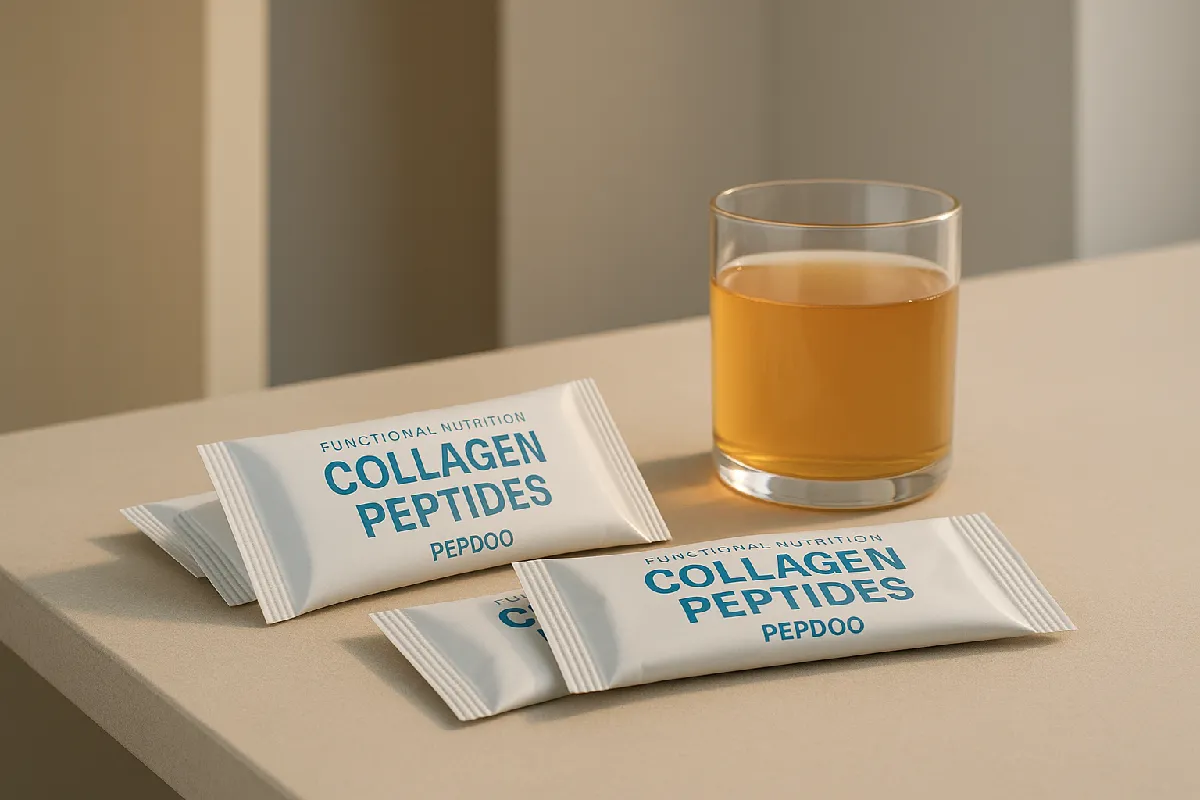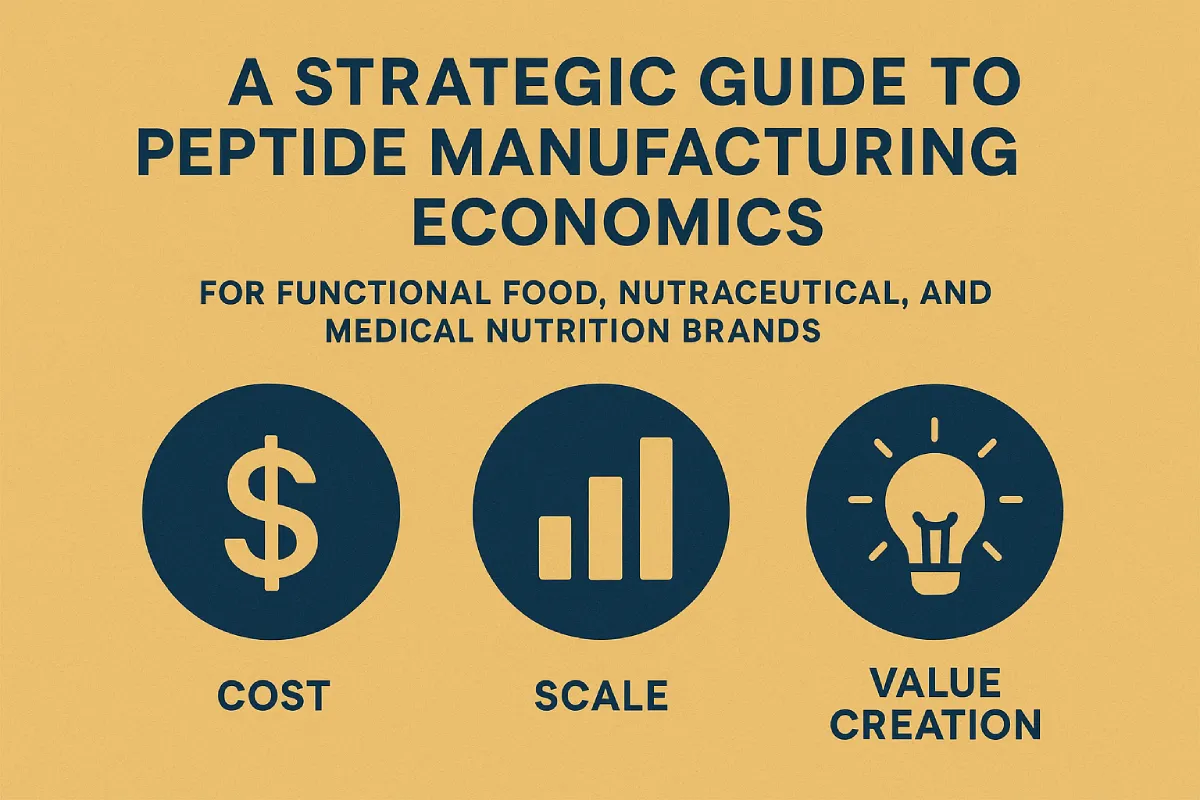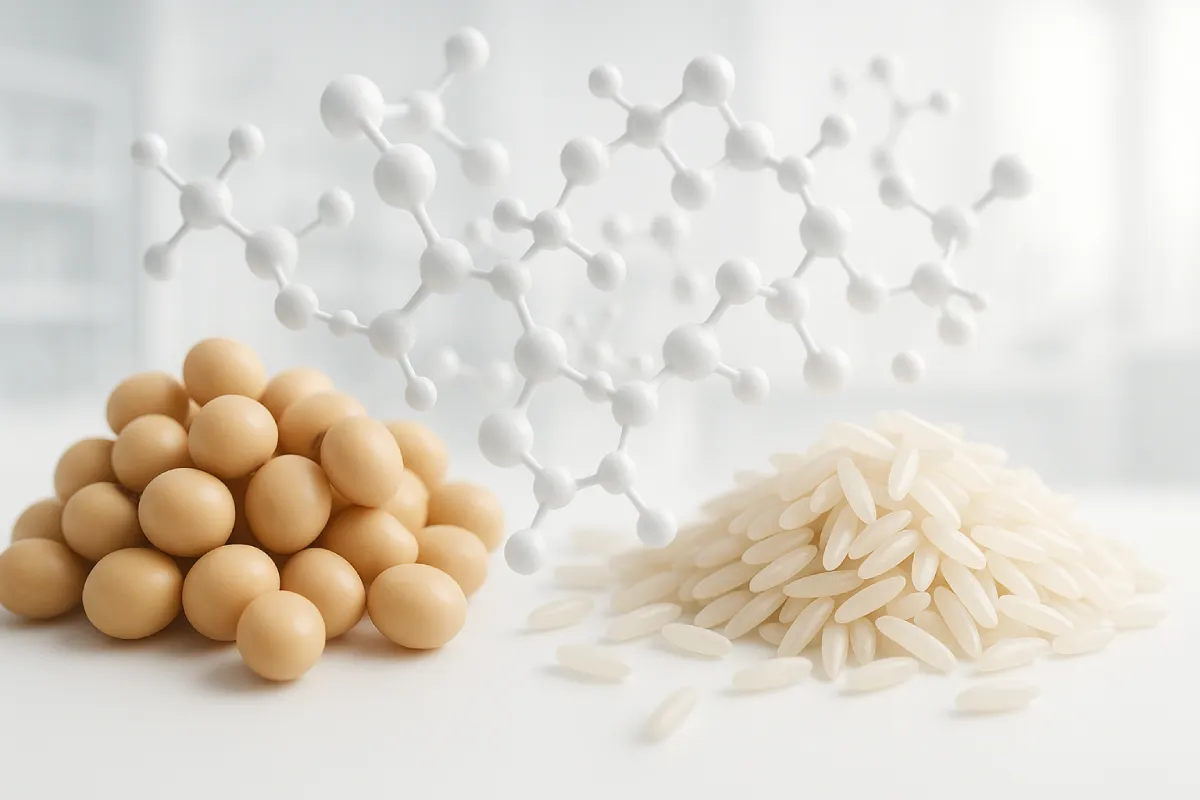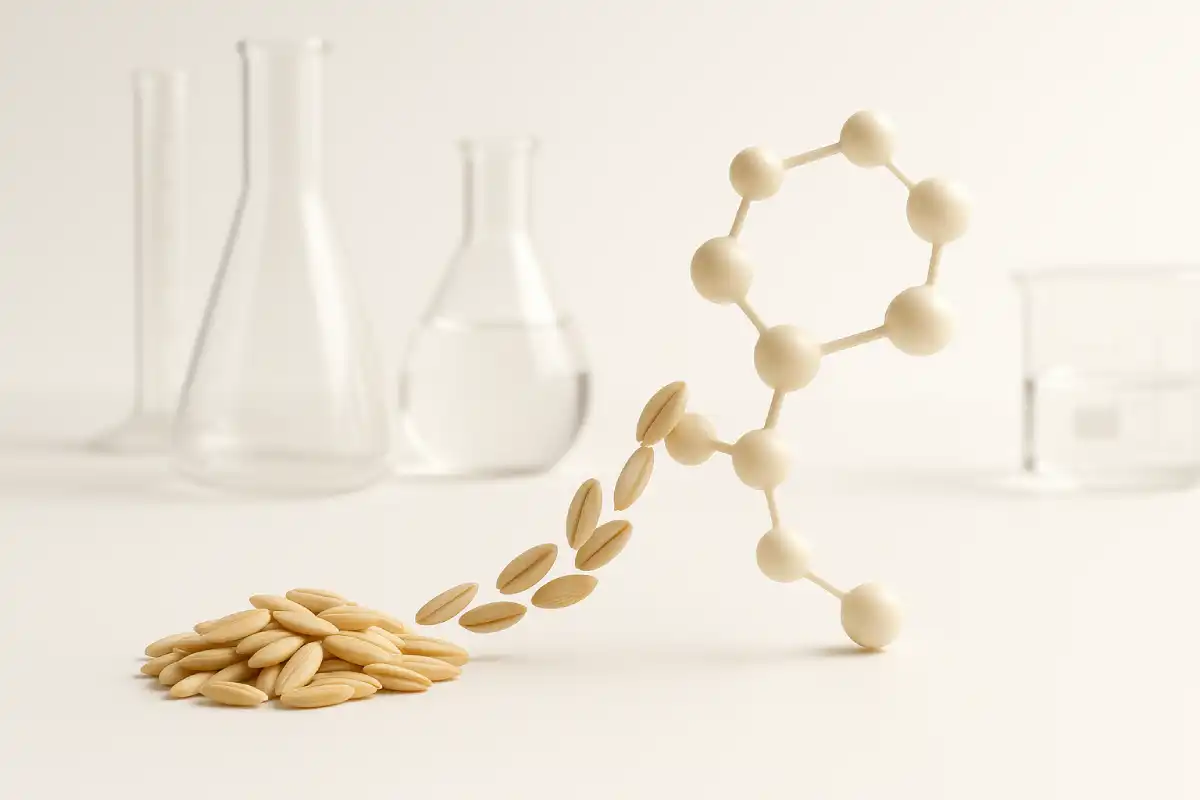Nanoencapsulation of Collagen Peptides: Overview and B2B Applications
Collagen peptides have emerged as key bioactive ingredients in functional nutrition, offering benefits for skin health, joint support, and overall wellness. However, their widespread application in functional foods, dietary supplements, and medical nutrition products is hindered by challenges such as poor stability, low bioavailability, and undesirable sensory characteristics. Nanoencapsulation technology offers a strategic solution by protecting collagen peptides from degradation, enhancing absorption, and improving product formulation versatility. This article explores the science, applications, and B2B relevance of nanoencapsulated collagen peptides, with a focus on functional nutrition innovations and case studies.
1. Why Nanoencapsulation Matters in Functional Nutrition
Collagen peptides, produced through enzymatic hydrolysis of collagen from animal or marine sources, are widely used in functional foods and nutraceutical products. They contribute to skin elasticity, joint flexibility, and muscle recovery, making them a sought-after ingredient in modern health-focused formulations.
Despite these advantages, functional nutrition brands often face difficulties in incorporating collagen peptides effectively. The peptides are sensitive to heat, pH variations, and enzymatic degradation, which reduces their stability during processing and storage. Additionally, oral ingestion can lead to low systemic absorption, limiting their bioavailability and overall efficacy. Undesirable sensory properties such as bitterness and poor solubility further constrain product development.
Nanoencapsulation, which involves encapsulating bioactive compounds in nanoscale carriers, provides a solution. By protecting the peptides from environmental stressors and improving their delivery, brands can offer high-performing, consumer-friendly products [1][2].
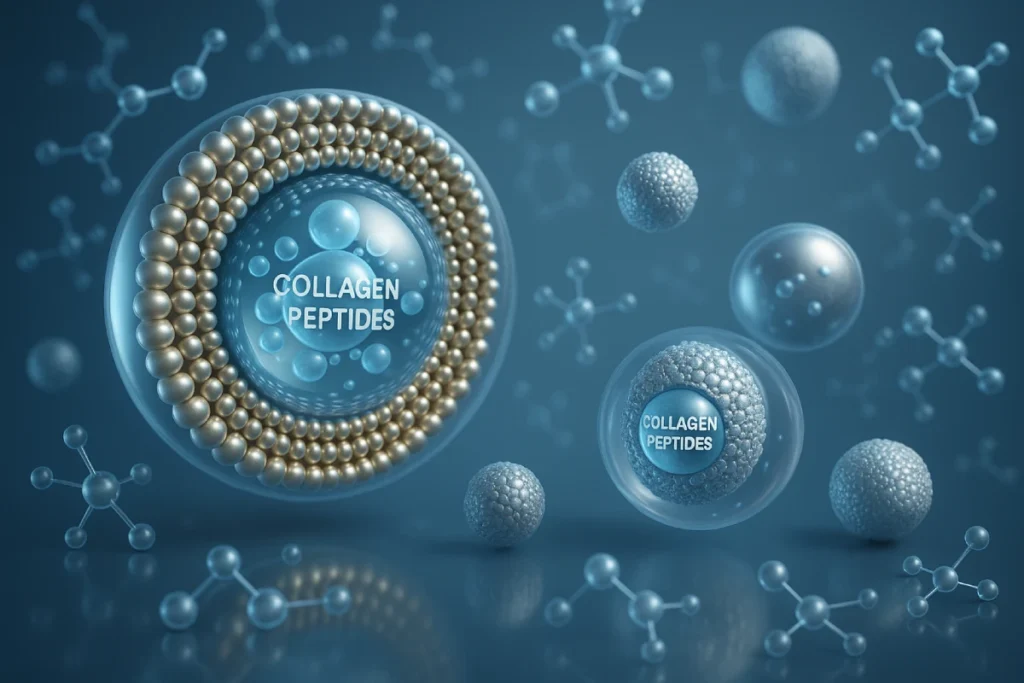
2. Challenges in Collagen Peptide Delivery
2.1 Stability Issues
Collagen peptides are prone to chemical and enzymatic degradation. Exposure to heat during pasteurization or baking, oxidative conditions, and light can cause structural breakdown, reducing the bioactivity of the peptides and compromising product efficacy. For B2B brands, this translates into shorter shelf life and inconsistent performance in final products.
2.2 Poor Bioavailability
Even if peptides remain stable in the product, oral ingestion introduces enzymatic degradation in the gastrointestinal tract, which significantly limits the amount of intact peptides that reach the bloodstream. For functional nutrition brands, ensuring that the bioactive compound is absorbed is critical to substantiating health claims.
2.3 Sensory Attributes
Unmodified collagen peptides may impart a bitter taste and poor solubility, which can negatively affect product palatability. This presents challenges for beverage and snack formulations, where consumer acceptance is key. Masking these sensory issues is essential for B2B clients aiming to launch premium functional nutrition products.
3. Nanoencapsulation Technologies
Nanoencapsulation uses nanometer-scale carriers to encase bioactive molecules, including collagen peptides, protecting them from environmental stressors and enhancing their delivery. Key nanoencapsulation systems include:
3.1 Liposomes
Liposomes are spherical vesicles with lipid bilayers that can entrap hydrophilic peptides. They protect peptides from enzymatic degradation and improve their transport across intestinal barriers.
3.2 Nanoparticles
Polymeric or protein-based nanoparticles allow controlled release of collagen peptides, maintaining bioactivity over extended periods and providing targeted delivery.
3.3 Nanogels
Nanogels offer hydrophilic networks that enhance solubility and mask bitter tastes, making them suitable for beverages and chewable products.
Benefits of nanoencapsulation for B2B clients include protection from degradation, enhanced bioavailability, and improved sensory profile [1][2].
4. Core Benefits of Nanoencapsulated Collagen Peptides
- Improved Stability: Encapsulation shields peptides from heat, light, and oxidative damage, extending shelf life.
- Enhanced Bioavailability: Nanocarriers facilitate peptide absorption in the gastrointestinal tract, ensuring bioactive compounds reach systemic circulation.
- Improved Sensory Experience: Encapsulation masks bitterness and enhances solubility, allowing seamless integration into drinks, bars, and capsules.
- Extended Shelf Life: Stabilized formulations support global supply chains and long-term storage, critical for B2B procurement.
5. Applications and B2B Relevance
5.1 Functional Beverages
Nanoencapsulated collagen peptides maintain stability in beverages that undergo pasteurization or require extended shelf life. Their improved solubility and taste profile increase consumer acceptance, making them ideal for protein-enriched drinks and wellness shots.
5.2 Dietary Supplements
Encapsulation allows collagen peptides to be incorporated into capsules or tablets without losing bioactivity. For B2B clients, this ensures product consistency, efficacy, and differentiates offerings in competitive nutraceutical markets.
5.3 Functional Foods
Nanoencapsulated peptides can be added to bars, powders, or baked goods. The protection against heat and enzymatic degradation ensures the peptides remain active, delivering measurable health benefits.
B2B Value:
- R&D: Simplifies formulation challenges
- Procurement: Ensures standardized and stable ingredient supply
- Marketing: Provides verifiable health claims and differentiates products
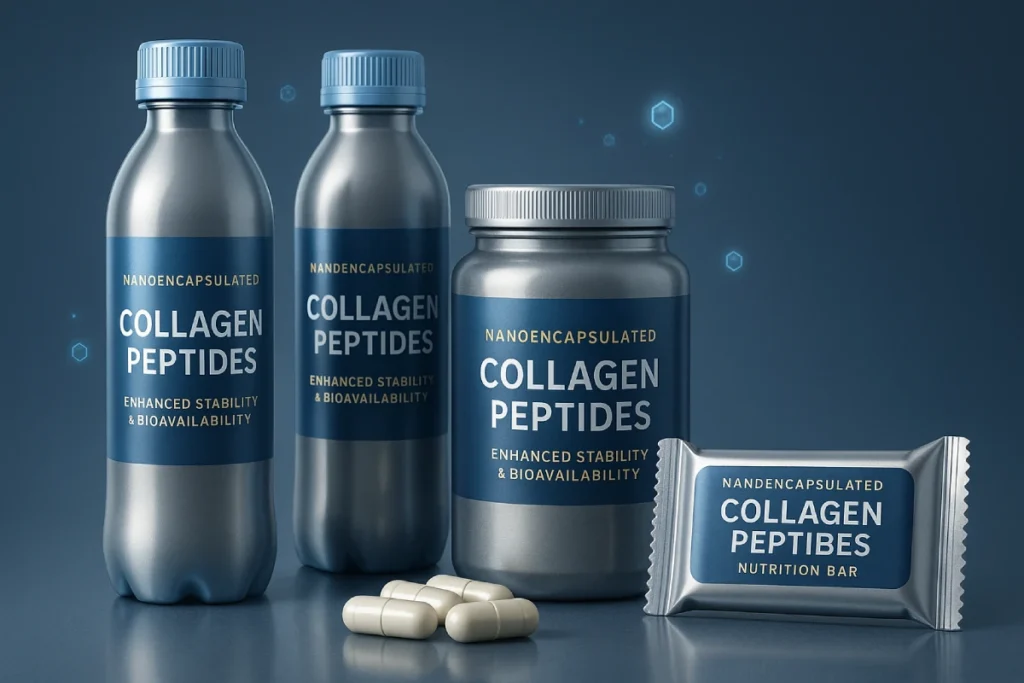
6. Case Studies
6.1 Marine Collagen Nanoencapsulation
A functional beverage company incorporated marine-derived collagen peptides using liposomal nanoencapsulation. The result: 35% higher stability during thermal processing, improved solubility and taste profile, and increased consumer acceptance and repeat purchase rates [2].
6.2 Skin Health Supplementation
A nutraceutical brand formulated a capsule containing nanoencapsulated collagen peptides. Clinical data showed 25% improvement in skin elasticity, enhanced hydration, and positive consumer feedback on effectiveness and ease of ingestion [2].
6.3 Medical Nutrition Applications
In a medical nutrition product for post-surgical recovery, nanoencapsulated collagen peptides improved absorption and systemic bioavailability, supporting faster recovery and protein metabolism.
7. Manufacturing and Quality Assurance
7.1 Manufacturing Processes
Common methods for producing nanoencapsulated collagen peptides include:
- Spray drying: scalable and efficient for powders
- Freeze-drying: preserves bioactivity
- Emulsification: suitable for beverage formulations
7.2 Quality Assurance
Strict adherence to GMP, stability testing, bioavailability assessments, and sensory evaluations ensures the ingredient meets B2B client expectations.
8. Conclusion and Call to Action
Nanoencapsulation offers functional nutrition brands a strategic advantage by improving collagen peptide stability, bioavailability, and sensory appeal. B2B clients can leverage these benefits to develop differentiated products, optimize formulations, and meet consumer demand for high-efficacy health products.
Unlock the Potential of Nanoencapsulated Collagen Peptides
Discover how nanoencapsulation improves collagen peptide stability, bioavailability, and taste. Learn how your brand can leverage this technology to create high-performing functional nutrition products.
Contact Our B2B Team →FAQ
A1: Nanoencapsulation protects collagen peptides from environmental stressors such as heat, light, and oxidation. For B2B clients, this ensures longer shelf life and consistent bioactivity across batches, reducing formulation risks and supporting reliable product performance.
A2: Yes. Encapsulation in nanocarriers facilitates transport through the gastrointestinal tract, allowing more peptides to reach systemic circulation. This is particularly valuable for brands seeking to substantiate health claims for skin, joint, or muscle benefits.
A3: Nanoencapsulated collagen peptides can be applied in functional beverages, dietary supplements (capsules, tablets), nutritional bars, and medical nutrition products. Brands benefit from improved solubility, taste masking, and compatibility with heat-sensitive formulations.
A4: Nanoencapsulation materials and processes must comply with food and nutraceutical regulations in target markets. B2B clients should request certificates of analysis, stability data, and safety assessments to ensure compliance with local and international standards.
A5: By improving stability and bioavailability, nanoencapsulated collagen peptides simplify formulation challenges, reduce the need for masking agents, and enable higher inclusion rates. This allows R&D teams to innovate with clean-label and functional claims, accelerating time-to-market.
A6: Absolutely. Products formulated with nanoencapsulated peptides can be marketed with enhanced bioavailability and scientifically-backed benefits. This provides a strong marketing edge, particularly in premium segments focused on skin, joint, and wellness solutions.
A7: Pepdoo® offers technical datasheets, formulation support, stability testing, and pilot-scale samples. B2B clients gain access to global-grade manufacturing, GMP compliance, and expertise in integrating nanoencapsulated collagen peptides into functional nutrition products efficiently.
References
- Gigliobianco, M. R., Casadidio, C., Censi, R., & Martino, P. D. (2018). Nanocrystals of poorly soluble drugs: Drug bioavailability and physicochemical stability. Pharmaceutics, 10(4), 1–19.
- Liu, Y., & Zhang, Y. (2020). Nanoencapsulation of bioactive peptides: A strategy to improve the stability and bioavailability. Food Research International, 137, 109337.
- Zhang, L., & Li, Y. (2021). Recent advancements in marine collagen: Exploring new sources and applications. Marine Drugs, 19(5), 1–17.
- Zhao, X., & Wang, Y. (2022). Development of “smart foods” for health by nanoencapsulation. Food Science & Nutrition, 10(6), 1771–1783.
- Zhou, Y., & Li, X. (2023). Nanoencapsulation systems for bioactive compounds. In R. S. R. Anwar & M. A. Khan (Eds.), Functional Foods and Nutraceuticals (pp. 35–56). Wiley.


